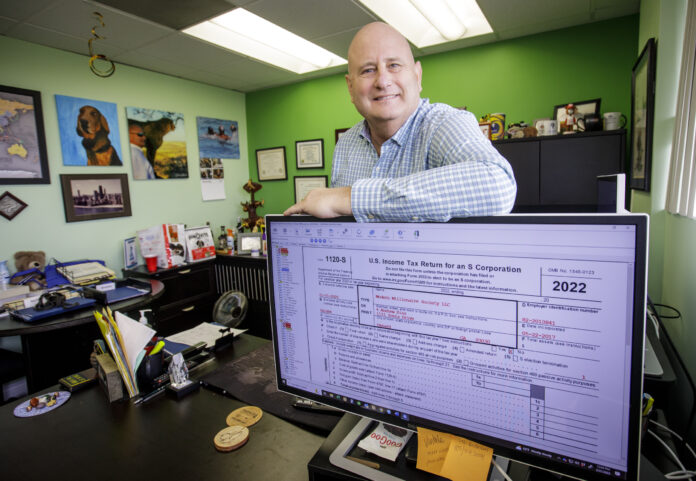Valley-area accounting firms are busily preparing for this year’s tax season, one characterized by employment challenges and workarounds meant to keep tax services on track.
Barry Peters, managing director at Thousand Oaks-based Premier Tax & Finance, has prepared for the season through the hiring of administrative staff and tax preparers and a tweak to the firm’s customer relationship management system designed to accommodate more clients.
“We hire throughout the year for the upcoming season for qualified tax professionals that can think critically,” Peters said.
The approach of hiring year-round is one taken by other firms as well, including Holthouse Carlin & Van Trigt LLP, which has offices in Encino, Camarillo and Westlake Village.
“We are pretty much in full hire mode all year long, (and) we hire-up for our busy seasons,” Holthouse Carlin’s Partner Greggory Hutchins said. “Hiring accounting majors from the local universities as interns is a large part of our strategy, with the end game being to hire them permanently once they graduate.”
Hutchins added that hiring is perhaps the most impactful issue accounting firms are facing, as there is more demand for services than firms can keep up with.
The tax and accounting talent shortage has worsened in recent years. Last year, a Bloomberg tax analysis found that in 2021 the total number of employed auditors and accountants dropped 17% from its 2019 peak of nearly 2 million.
Holthouse Carlin has firsthand experience in seeing such numbers dwindle, having noticed a downward trend in the number of accounting graduates. Hutchins attributed the decline in part to accounting not having the reputation as an exciting industry, adding that students needing to attain five years of college credits as opposed to four was another detrimental factor.
In addition to improving employment tactics, better use of technology and staying updated on tax compliance requirements have become integral to firms’ success during busy tax seasons.
Technology’s role
Baker Tilly, an advisory CPA firm with a presence in the San Fernando Valley, is one such company that relies on technology to keep pace with demand for its services.
“One way (we use technology is) through process and technology automation focused on reducing or eliminating non-value-added tasks and streamlining processes,” Baker Tilly Partner Greg Zelenay said. “This creates efficiencies, but even more important, it allows our team members more time to focus on more challenging work that creates even more value for our clients.”
Zelenay is based in Encino and has worked with Baker Tilly for 10 years. The large firm has also leaned on complementary workforce solutions such as outsourced and offshore resources that reinforce its teams’ work.
Despite the employment challenges and their impact on tax services, there is some reprieve to be found within this year’s tax season, according to Hutchins.
“Most of us in California have received a bit of reprieve in terms of the typical March and April deadlines,” he said. “Specifically, for most in California, the due dates this year have been moved to May 15th as a result of (this winter’s) devastating floods. Fortunately, this tax season hasn’t seen a ton of legislative changes, so that’s helpful.”
Peters said the postponement of the filing date affects Los Angeles, Ventura and Santa Barbara counties, among others. He added that, as in any other tax season, his team participates in classes to stay up to date with changes.
“Changes in the tax law occur every year, if not every month,” Peters said. “Tax-update classes are a must to keep abreast of the new laws, for me as the director and for all our tax professionals.”
The main challenge for Peters and his team is completing returns on a timely basis and meeting the expectations of clients, noting that nobody wants to wait for their return to be prepared if they are getting money back.
Hutchins said that a big challenge for his firm and colleagues involves planning opportunities that firms need to take advantage of.
“Generally, when doing tax returns in March or April, it’s too late to do much for the prior year since it is in the rearview mirror,” Hutchins said. “There are, however, ways to take advantage of existing opportunities, such as the state and local tax deduction workaround, known as PTE, that is available for pass-through entities.”
According to the state franchise tax board, qualifying pass-through entities, or PTEs, can annually elect to pay an entity level state tax on income. The tax is 9.3% of an entity’s qualified net income and is popular in California: the state collected more than $22 billion from PTE taxes since its July 2021 inception through October of last year.
Capital gains watch

Hutchins added that firms and clients alike should be aware of businesses that may have had significant capital gains last year, as there is still time to take advantage of deferring gains by investing in opportunity zones.
Opportunity zones, as defined by the Internal Revenue Service, are economic development tools that allow people to invest in distressed areas in the United States. The purpose of the zones is to spur economic growth and job creation in low-income communities while providing investors with tax benefits.
An important change the accounting industry is keeping track of is the Inflation Reduction Act, a 10-year plan that covers new and reinstated tax laws that will affect individuals and businesses via credits and deductions.
According to Landsman, of Baker Tilly, the act encompasses several changes that impact investment accounts, retirement accounts, charity contributions, student loan debt and employer plans.
“Some workplace plans are not set up for all of the new provisions,” Landsman said. “As a result, these changes will require plan adjustments and retooling in 2023 in preparation for 2024.”
Peters noted extensions to the solar tax, electric car and energy credits as notable changes made by the act.
Although several changes come along with the Inflation Reduction Act, Hutchins noted that most of the new legislation is effective already this year, meaning his firm does not expect much, if any, impact for this tax season. “It will definitely be part of our planning exercises as we plan for 2023 and beyond,” Hutchins said.
